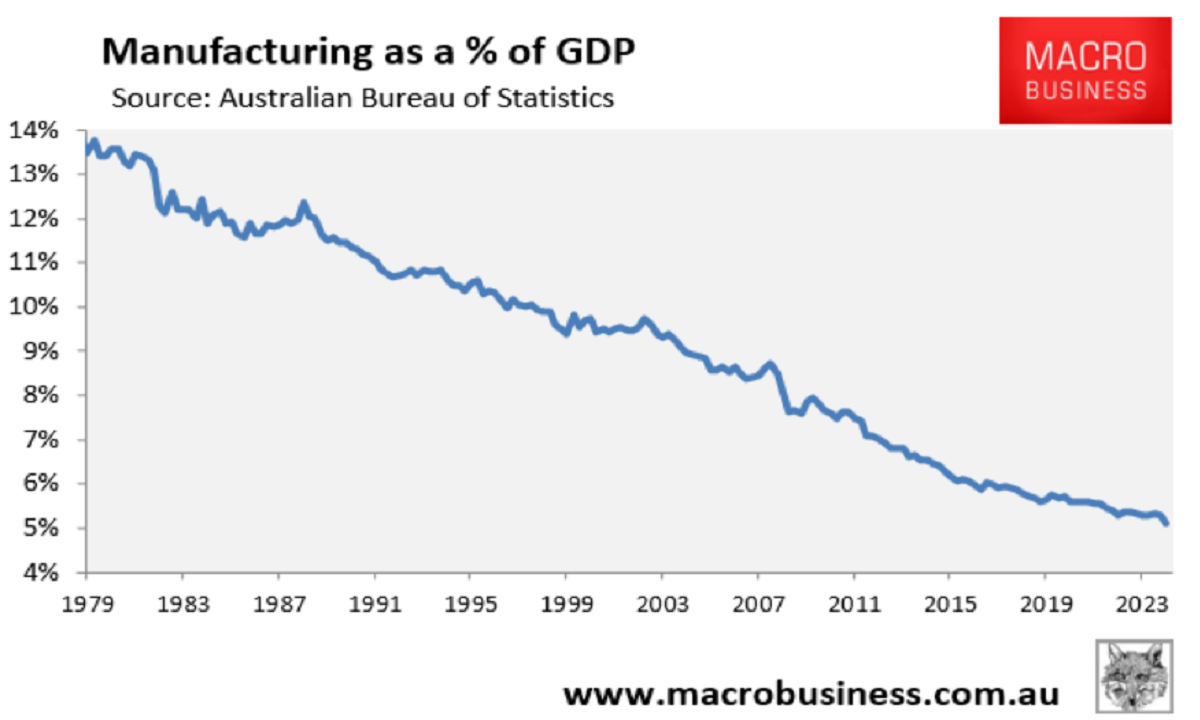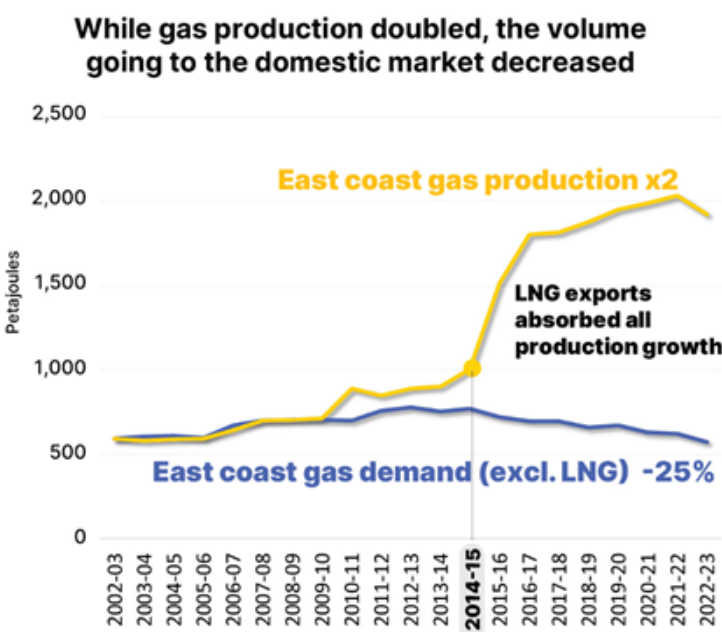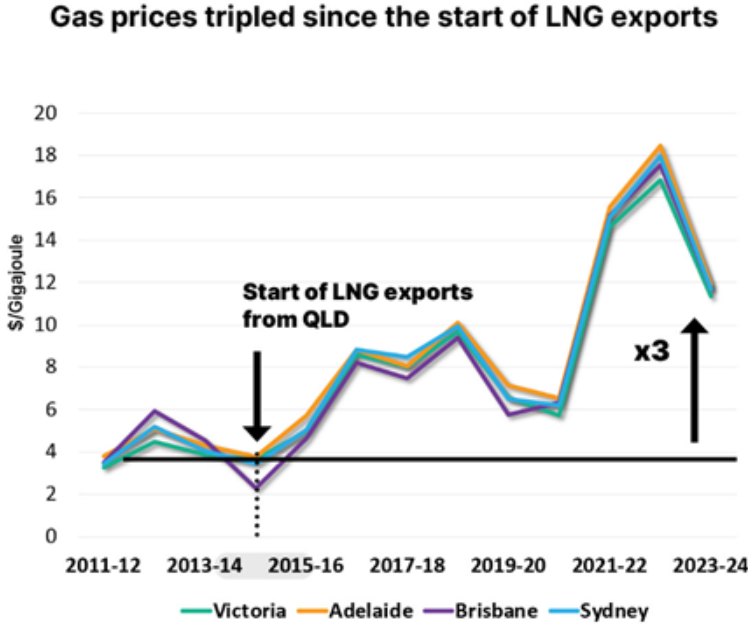In the early 2010s, the federal Labor government made the disastrous decision to allow the export of liquefied natural gas (LNG) from Queensland without forcing gas companies to first supply Australians.
Gary Grey, the then-Federal Resources Minister under the Gillard/Rudd Labor governments, argued that domestic gas reserve policies create uncertainty and discourage investment, pitting the government against Australia’s ailing manufacturing sector, which was yearning for cheaper gas.

“The Australian Government does not agree that domestic gas reservation would keep gas prices down or put more gas into the market”, Gray said in his opening address to the Australian Petroleum Production and Exploration Association conference in Brisbane on 27 May 2013.
“In our view, it would create uncertainty and deter investment in new gas supply”.
Gary Gray reiterated his opposition to East Coast domestic gas reservation in July 2013.
“Let me say very clearly, a reservation policy could not lead to lower gas prices or more gas”, Gray said.
“Calls for intervention in the market only serve to dampen any appetite for the very investment that’s needed to bring on new gas supplies”.
“We must allow our markets to respond as they are intended to do”.
Federal Labor’s anti-reservation stance positioned them against then Western Australian Premier Colin Barnett, whose state government operates a domestic reservation plan that requires major offshore gas projects to reserve some of their gas for the domestic market.
“As a result, the Chevron-led Gorgon and Wheatstone projects are building domestic gas plants in conjunction with the bigger and more lucrative LNG operations while Woodside Petroleum is under pressure to build a domestic operation alongside its Pluto LNG plant near Karratha”, reported The West Australian in May 2013.
“Local manufacturers led by Alcoa have been instrumental in driving the WA Government to implement the domestic gas policy as a way of trying to ensure lower gas prices, and a similar push is under way in eastern Australia”.
The rest is history. The Gladstone LNG export terminals went online, and East Coast Australia now exports almost three-quarters of its gas.
Gary Grey retired from politics in 2016 and took a role as general manager of external affairs for Mineral Resources, a Western Australian mining resources company. Before his federal political career, Grey had worked as an advisor to Woodside Petroleum.
While East Coast gas output has doubled since East Coast gas exports commenced, 25% less gas is now delivered to the domestic market.

The resulting domestic shortage roughly tripled East Coast gas prices:

The tripling of gas prices has also driven up electricity prices, given gas’s key role in firming and as a marginal price setter in the wholesale electricity market.
Despite being a major supplier of LNG, East Coast Australia now faces the horrifying prospect of having to import gas. Importing LNG would result in even higher gas and electricity rates, since the East Coast gas price would rise to import-parity levels (i.e., the export prices plus liquefaction, transportation, and regasification).
To its credit, the Turnbull Coalition government established the Australian Domestic Gas Security Mechanism (ADGSM) in 2017 to give the federal government the authority to enforce reservation in the East Coast gas market.
However, when Russia attacked Ukraine, the Albanese government declined to invoke the ADGSM, causing East Coast gas and electricity costs to skyrocket.
To exacerbate the situation, the Morrison government completed a gas reservation options paper shortly before the 2022 federal election.
However, the newly elected Albanese government prohibited its public release, citing concerns that it might upset Asian consumers of Australian gas.
The federal Department of Industry, Science, and Resources (now DCCEEW) claimed that “gas reservation acts as a tax on gas production, paid as a subsidy to domestic gas users”, as if Australians weren’t their top priority.
Fast forward to 2025, and the Coalition during the federal election campaign vowed to introduce an East Coast gas reservation policy if elected that will deliver $10 per gigajoule gas by compelling uncontracted (spot) gas to be diverted into the domestic market.
The Coalition’s policy would have eliminated the need to import LNG.
Shell Australia chair Cecile Wake reluctantly conceded that the Coalition’s gas reservation policy would have reduced gas costs for consumers.
According to Wake, the policy would “potentially push more supply into the market than there is actual demand … and when that happens, it has the effect of potentially driving prices even lower than the $10 [a gigajoule]”.
If that isn’t a strong endorsement of the Coalition’s reservation policy, I don’t know what is.
The Coalition also pledged to invest $1 billion in a Critical Gas Infrastructure Fund to expand gas pipeline and storage capacity.
Extra pipeline capacity and storage are required to ensure gas flows to Victoria during the peak winter months, when the north-south pipeline is at capacity.
Federal Resources Minister Madeleine King dismissed the Coalition’s gas reservation policy as a “thought bubble”.
Labor obviously won the federal election, jettisoning the Coalition’s gas reservation policy. As a result, the East Coast may soon begin importing LNG at an import parity cost of around $20 a gigajoule, double what the Coalition promised. The increase will also drive electricity prices higher.
However, there is glimmering hope for policy changes from the Albanese government.
Federal Resources Minister Madeleine King addressed the Australian Energy Producers conference in Brisbane on Tuesday. Amid growing fears of a looming gas shortage on the East Coast, King said that Australians are “tired of seeing our vast gas resources exported overseas” while paying high prices at home. “Australians recognise this to be unfair”.
King added that while some Australian LNG producers are “doing the right thing” by ensuring that there is sufficient domestic supply, a lot of work still needs to be done on this issue. She added that the federal government plans to undertake a review of laws and regulations governing the LNG sector to ensure that they are working as intended.
All we can hope for is that Labor sees the error in its ways and emulates the Coalition’s excellent East Coast reservation policy. Or copy Western Australia’s gas reservation policy.
Without gas reservation, East Coast Australia will commence LNG imports. Gas and electricity prices will soar, placing upward pressure on inflation, worsening cost-of-living, and sending more manufacturing offshore to China, which continues to receive the bulk of East Coast gas.
Labor must right its gas policy wrongs.

